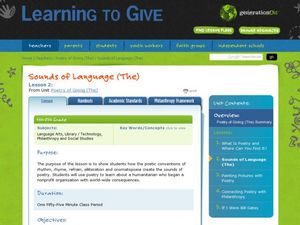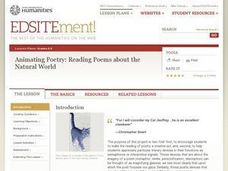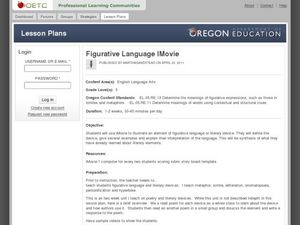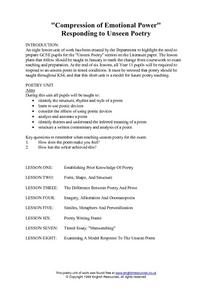Curated OER
The Sound of…Poetry!
Scritch, scratch, scritch. It's the sound of pupils writing poetry! Focus on sensory language and onomatopoeia with a writing lesson. After listening to some sounds, learners examine a couple of poems that include sound words and then...
Poetry4kids
Onomatopoeia Poetry Lesson Plan
Two exercises boost scholars' knowledge of a onomatopoeia with excerpts from famous poems. In exercise one, participants circle onomatopoeia words. Exercise two challenges writers to choose three words to use in an original poem.
Curated OER
Poetry Beyond Words
Participate in writing poetry as a group. Focused on a given theme, young writers compose a popcorn poem using sensing verbs and adverbs. They write popcorn poems, onomatopoeias, collective poems, and diamond poems. You could introduce...
Curated OER
Use Digital Photos of Scary Things to Inspire Poetry Writing
There's nothing like a provocative image to inspire a creative writing session. In the language arts lesson presented here, middle schoolers bring in digital photos of scary objects, such as a big spider, or a hornet's nest. The pictures...
Curated OER
Short Poems Are Scary!
What do all those chairs and pencils do in the classroom once everyone leaves? Allow imaginations to run wild with frighteningly short poems!
Curated OER
Onomatopoeia Poems
Students write onomatopoeia poems. In this creative writing instructional activity, students listen to a picture book that introduces the concept of onomatopoeia. Students create their own list of words and write a short poem using...
Utah Education Network (UEN)
7th Grade Poetry: Ode Poem
Walt Whitman's "Captain, My Captain" and Robert Frost's "The Road Not Taken" provide seventh graders with examples of odes. After reading and discussing these and other examples, young poets craft an ode and respond to the ode of a...
Utah Education Network (UEN)
7th Grade Poetry: Assess
To assess what scholars have learned throughout a five-lesson poetry unit, seventh graders first craft a Shakespearean sonnet based on a poem they have studied. In part two of the assessment, scholars complete a four-texts performance task.
K20 LEARN
Where I'm From: Poetry
We carry memories of where we're from; tweens and teens can capture these memories by first listening to several memory poems and then crafting their own. They analyze literary devices other poets use, brainstorm a list of images they...
Curated OER
Sound poems
Third graders write a class poem based on the use of sound to create effects. They investigate use of onomatopoeia and how to write in a tight structure.
Curated OER
The Poetry of Giving
Learn about philanthropy and poetic conventions with an inclusive lesson about Bill Gates. After learning about Mr. Gates' humanitarian efforts in the world, sixth graders use alliteration, onomatopoeia, rhyme, rhythm, and refrain in...
National Park Service
The Poet's Toolbox
If you need a lesson for your poetry unit, use two poems by Henry Wadsworth Longfellow ("Rain in Summer" and "The Slave in the Dismal Swamp") and a resource on Elements of Poetry. The lesson plan guides you through activities on...
National Endowment for the Humanities
Animating Poetry: Reading Poems about the Natural World
Students complete poetry analysis activities. In this poetry analysis instructional activity, students consider the use of imagery and sound devices in poetry. Students translate poetry into another art, read a diverse selection of...
Curated OER
Poetic Elements Are Fun!
Engage your class in the elements of poetry with a series of lessons and activities. The plans cover simile, metaphor, personification, onomatopoeia, alliteration, and imagery. Learners come up their their own metaphors, identify poetic...
Curated OER
War Literature
Working in groups, young historians review a war poem written by Stephen Crane. After reviewing the poem, they present an oral interpretation of the poem and hold a panel discussion about their analysis. The panel is made up of five or...
Curated OER
Using Onomatopoeia
Students explore onomatopoeia. They discuss the definition of onomatopoeia. Students brainstorm words that use onomatopoeia and they create a words work to use as a reference for poetry writing.
Curated OER
Creating Sentences with Onomatopoeia Words
Third graders create sentences. In this sentences instructional activity students use onomatopoeia words to write sentences. They make a movement to match their onomatopoeia word. The students discuss why an author might use onomatopoeia...
Curated OER
Poetry: A Picture of Feelings
Students take a field trip to a place of interest. After the trip they share with a partner their most memorable memory about it. Later, they paint a picture representative of the trip and illustrate it with a poem using at least two...
Curated OER
Onomatopoeia
This mini-lesson plan on onomatopoeia introduces the device through a poem and definition. It culminates in drawing an element of nature with the sound associated with it written across the picture.
Curated OER
Musical Poetry
Young scholars analyze lyrics of their favorite songs as examples of alliteration, metaphor, Onomatopoeia, personification, rhyme, and simile to determine the purpose of these devices in poetry. They use their analysis to create a...
Curated OER
Edward Lear, Limericks, and Nonsense
Introduce your class to the delights of nonsense poetry and explore literary devices with the writing of Edward Lear. Learners identify rhyme and meter as well as figures of speech, alliteration, and onomatopoeia in "The Owl and the...
Curated OER
All Aboard!
Learners recognize and identify onomatopoeia. They will read the book All Aboard! A True Train Story, by Susan Kuklin. After reading the book, they list and illustrate examples of onomatopoeia. Then they write a poem or story using...
Curated OER
Figurative Language iMovie
In order to understand figurative language, learners read 5 poems, each exemplifying a different literary device. They discuss and write responses to each poem. They then choose one literary device which they will use as the basis for a...
Curated OER
"Compression of Emotional Power"--Responding To Unseen Poetry
Eleventh graders identify the structure, rhythm and style of a selected poem, experience utilizing poetic devices and analyze an annotated poem. They evaluate the themes and inferred meanings to a variety of poems from their textbooks.

























